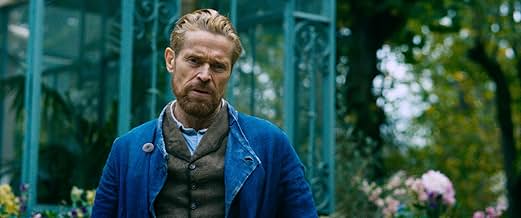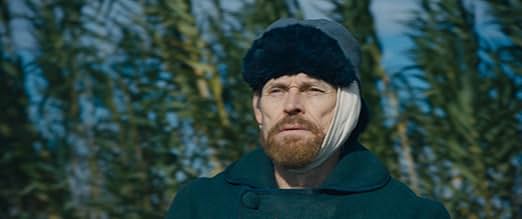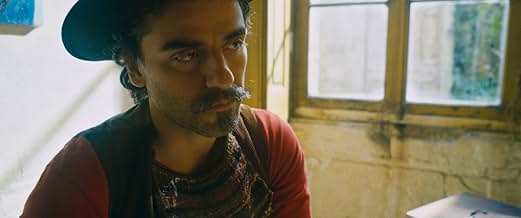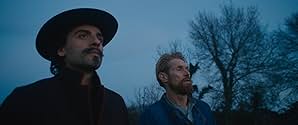Una mirada a la vida del pintor Vincent van Gogh durante el tiempo que vivió en Francia.Una mirada a la vida del pintor Vincent van Gogh durante el tiempo que vivió en Francia.Una mirada a la vida del pintor Vincent van Gogh durante el tiempo que vivió en Francia.
- Dirección
- Guionistas
- Elenco
- Nominado a 1 premio Óscar
- 3 premios ganados y 16 nominaciones en total
Clément Paul Lhuaire
- Emile Bernard
- (as Clément Lhuaire)
Alan Aubert
- Albert Aurier
- (as Alan Aubert-Carlin)
- …
- Dirección
- Guionistas
- Todo el elenco y el equipo
- Producción, taquilla y más en IMDbPro
Opiniones destacadas
AT ETERNITY'S GATE is by no stretch meant to be a pure biography of Van Gogh. I think you need to already be familiar with some of the outlines of his story and it would help to be an appreciator of his work already. What we're really seeing here is director Julian Schnabel's attempt to show us the world as seen through the eyes of Van Gogh. How did he see things and what inspired him. What drove him to madness? What frustrated him in his relations with people? How did he slip into madness (if, indeed, he did)?
Hence, there are a lot of shots of scenery seen through Van Gogh's eyes. I don't know if star Willem Dafoe had a go-pro strapped to his head, or what...but we see walking feet, we see the ground, then the sky, then the landscape...over and over. We see him painting. We see him sitting still and contemplating the land around him. If you can give yourself over to this, it is fairly effective. Instead of wondering when something will happen, just try to experience what you're seeing and hearing. You may be drawn into seeing how Van Gogh saw beauty in the rough landscape around him and how he could NOT stop from painting it in a fever of wanting to catch it before it slipped away. At the same time, these scenes teeter on the edge of tedium.
There are more conventional scenes, to be sure. We see interactions between Van Gogh and Paul Gaughin (Oscar Isaac) and an extensive conversation between Van Gogh and a priest (the excellent Mads Mikkelsen). However, these scenes are full of characters talking about how they see art and the world around them...they speak to each other in lectures. So, the dialogue is not convincing...but it IS interesting. Again, I think it may help to already be interested in Van Gogh.
Scenes with Vincent and his brother Theo (Rupert Friend) are more poignant and personal, along with his interactions with the villagers around him. We see his awkwardness with people and yet feel his need to connect. We get a sense of his crushing poverty. (By the way, Dafoe is WAY too old to be playing this part...but his unusual face actually seems right for the role. No doubt Van Gogh would have been weary and weathered at the end of his life. Dafoe, overall, is pretty darn good here.)
It's an effective movie in many regards, but I tried hard to let myself be completely swept away by it and couldn't quite escape my impatience from time to time.
(I will say that if I were an art teacher; this would be a great film to show my college class. Study the bio of Van Gogh from a textbook, and then show this film. I've never seen a better attempt to put the viewer into the mind, or even psyche, of a great painter. It's a very noble, worthwhile effort. Very much for art lovers, or those wishing to be.)
Hence, there are a lot of shots of scenery seen through Van Gogh's eyes. I don't know if star Willem Dafoe had a go-pro strapped to his head, or what...but we see walking feet, we see the ground, then the sky, then the landscape...over and over. We see him painting. We see him sitting still and contemplating the land around him. If you can give yourself over to this, it is fairly effective. Instead of wondering when something will happen, just try to experience what you're seeing and hearing. You may be drawn into seeing how Van Gogh saw beauty in the rough landscape around him and how he could NOT stop from painting it in a fever of wanting to catch it before it slipped away. At the same time, these scenes teeter on the edge of tedium.
There are more conventional scenes, to be sure. We see interactions between Van Gogh and Paul Gaughin (Oscar Isaac) and an extensive conversation between Van Gogh and a priest (the excellent Mads Mikkelsen). However, these scenes are full of characters talking about how they see art and the world around them...they speak to each other in lectures. So, the dialogue is not convincing...but it IS interesting. Again, I think it may help to already be interested in Van Gogh.
Scenes with Vincent and his brother Theo (Rupert Friend) are more poignant and personal, along with his interactions with the villagers around him. We see his awkwardness with people and yet feel his need to connect. We get a sense of his crushing poverty. (By the way, Dafoe is WAY too old to be playing this part...but his unusual face actually seems right for the role. No doubt Van Gogh would have been weary and weathered at the end of his life. Dafoe, overall, is pretty darn good here.)
It's an effective movie in many regards, but I tried hard to let myself be completely swept away by it and couldn't quite escape my impatience from time to time.
(I will say that if I were an art teacher; this would be a great film to show my college class. Study the bio of Van Gogh from a textbook, and then show this film. I've never seen a better attempt to put the viewer into the mind, or even psyche, of a great painter. It's a very noble, worthwhile effort. Very much for art lovers, or those wishing to be.)
Loved the raw hand held camera work . The director shows the scene in such a that u can really enter into vincent's mind and can see his vision . Obviously the acting of Willem Dafoe was tremendous and he took the character to another level .
Vincent Van Gogh's last days in the south of France are depicted in this heartfelt drama by Julian Schnabel. Willem Dafoe gives a powerful performance as the destitute, troubled painter who was not understood by those in his own time. As Van Gogh seeks to express his extraordinary eye for nature and portraits, those around him are either put off, wary or sometimes intrigued. His brother is his only real comfort.
A deliberately paced film with a mournful soundtrack, this will leave you in a contemplative state. It does not tell you everything about Van Gogh or when his self-isolation began but it does seek to offer insight into his profoundly troubled mental state. His demons are quite evident throughout the film- everything from his intolerant response to the curiosity of schoolchildren to his difficulty explaining his world to whatever doctor is examining him, Van Gogh is exemplified in Dafoe's anguished face. Schnabel, himself a painter, brings his own perspective in piecing this film together, especially in showing how Van Gogh paints and goes about his craft.
The film is not without drawbacks. Oscar Isaac is miscast as Paul Gauguin, the French painter whom Van Gogh couldn't bear losing company with. And Mads Mikkelsen gets minimal screen time in a very thoughtful performance as an inquisitive priest who recognizes Van Gogh's uniqueness. But this film is Schnabel's interpretation of Van Gogh and Dafoe's exemplary portrayal of him and in that regard it works quite well. Recommended.
A deliberately paced film with a mournful soundtrack, this will leave you in a contemplative state. It does not tell you everything about Van Gogh or when his self-isolation began but it does seek to offer insight into his profoundly troubled mental state. His demons are quite evident throughout the film- everything from his intolerant response to the curiosity of schoolchildren to his difficulty explaining his world to whatever doctor is examining him, Van Gogh is exemplified in Dafoe's anguished face. Schnabel, himself a painter, brings his own perspective in piecing this film together, especially in showing how Van Gogh paints and goes about his craft.
The film is not without drawbacks. Oscar Isaac is miscast as Paul Gauguin, the French painter whom Van Gogh couldn't bear losing company with. And Mads Mikkelsen gets minimal screen time in a very thoughtful performance as an inquisitive priest who recognizes Van Gogh's uniqueness. But this film is Schnabel's interpretation of Van Gogh and Dafoe's exemplary portrayal of him and in that regard it works quite well. Recommended.
At Eternity's Gate is an amazing piece of art. I will admit that in order to fully appreciate its artistic offerings one would most definitely need very minor prior knowledge to who Vincent Van Gogh was. What his ideologies were, and the major events of his life, as well as his relationship with his brother. The way lines are repeated multiple times in a way that sounds like an echo chamber to show the audience the way Vincent is perceiving conversation on a delay, rationally speaking. One critique I see a lot is of the very long scenes of Vincent running around in wilderness looking for something to paint, and the overbearing music that surrounds those scenes. I disagree with these critiques but I do understand them. I feel it was necessary to have this music in order for the audience to understand the pure child-like joy Vincent felt while looking for something to paint, and while experiencing nature. I highly recommend this film for any Vincent Van Gogh fans. It is just shy of a perfect movie in my opinion, but I can see why someone would very much disagree with that.
At Eternity's Gate is perhaps one of the most artistic films that I've seen. It somehow manages to give the sense that it took Van Gogh's painting style and put it in film form, and it was quite effective.
I'll just start by saying At Eternity's Gate is not a movie that will work for everyone. The directing style used is not very common. There are plenty of shaky cameras, as well as many uses of first person point of view and weird dialogue loops. There are many sequences of no dialogue at all, where you are simply watching Van Gogh walking in a field or just painting. There are also lengthy sequences of only dialogue, some for 5 minutes at a time. Some people may find this film boring or even just annoying to try to watch. I, however, really appreciated the artistic directing style and approach to this film. It is also a beautifully shot movie. When Van Gogh is walking through nature, the shots, albeit sometimes a little shaky to fit the style, really capture the beauty of his surroundings in a way that can be breathtaking at times.
As for the plot of this movie, there really isn't one. You should instead think of it as a collection of scenes put together, roughly in order, that illustrate various key experiences near the end of painter Vincent Van Gogh's life. This will make the film a bit less confusing. Sitting there trying to connect everything you see under one plot would be very difficult, so it's better to just watch it scene by scene as you move through Van Gogh's life and try to get a sense of his motivations and state of mind. I found this to be a very interesting decision, but it added to the creativity of the film and made it feel more like a piece of art, so I understood and even appreciated this odd strategy.
The main thing this film tries to do is show the mental state of Van Gogh and almost try to get inside his head. This made for some very odd sequences in the film, but also made for a very unique and interesting movie. It might not work well 100% of the time, but for the most part, I was fascinated with the way they attempted to convey Van Gogh's mental instability.
Willem Dafoe in the lead role gives an outstanding performance (not that it's unexpected for that to happen). He portrays both the crazy and likable sides of Van Gogh to perfection, and really captures the incredible passion he had for art and painting. Oscar Isaac also gives a great performance as Gauguin, the other artist who's a little crazy (albeit much less so than Van Gogh). The rest of the cast holds there own as well, and the characters are all interesting to learn about.
The music in this film is also a bit strange at times, but seems to fit very well with the style and subject matter of the movie, and even is able to enhance the beauty of Van Gogh's surroundings when he is walking through nature.
At Eternity's Gate is a film that may not be for everyone, but it's creativity and great performances make it worth watching if you can manage watching the unique directing style.
I'll just start by saying At Eternity's Gate is not a movie that will work for everyone. The directing style used is not very common. There are plenty of shaky cameras, as well as many uses of first person point of view and weird dialogue loops. There are many sequences of no dialogue at all, where you are simply watching Van Gogh walking in a field or just painting. There are also lengthy sequences of only dialogue, some for 5 minutes at a time. Some people may find this film boring or even just annoying to try to watch. I, however, really appreciated the artistic directing style and approach to this film. It is also a beautifully shot movie. When Van Gogh is walking through nature, the shots, albeit sometimes a little shaky to fit the style, really capture the beauty of his surroundings in a way that can be breathtaking at times.
As for the plot of this movie, there really isn't one. You should instead think of it as a collection of scenes put together, roughly in order, that illustrate various key experiences near the end of painter Vincent Van Gogh's life. This will make the film a bit less confusing. Sitting there trying to connect everything you see under one plot would be very difficult, so it's better to just watch it scene by scene as you move through Van Gogh's life and try to get a sense of his motivations and state of mind. I found this to be a very interesting decision, but it added to the creativity of the film and made it feel more like a piece of art, so I understood and even appreciated this odd strategy.
The main thing this film tries to do is show the mental state of Van Gogh and almost try to get inside his head. This made for some very odd sequences in the film, but also made for a very unique and interesting movie. It might not work well 100% of the time, but for the most part, I was fascinated with the way they attempted to convey Van Gogh's mental instability.
Willem Dafoe in the lead role gives an outstanding performance (not that it's unexpected for that to happen). He portrays both the crazy and likable sides of Van Gogh to perfection, and really captures the incredible passion he had for art and painting. Oscar Isaac also gives a great performance as Gauguin, the other artist who's a little crazy (albeit much less so than Van Gogh). The rest of the cast holds there own as well, and the characters are all interesting to learn about.
The music in this film is also a bit strange at times, but seems to fit very well with the style and subject matter of the movie, and even is able to enhance the beauty of Van Gogh's surroundings when he is walking through nature.
At Eternity's Gate is a film that may not be for everyone, but it's creativity and great performances make it worth watching if you can manage watching the unique directing style.
¿Sabías que…?
- TriviaWillem Dafoe was 62 when the film was released, 25 years older than Vincent van Gogh, who died at age 37.
- ErroresTheo tells Vincent at the hospital that he is now married. In reality Vincent received a letter from his brother on Dec 23rd 1888, in which he announced his engagement. Vincent feared that his brother would not be able to support him, once married. Additional to this he had the argument with Gaugin that night over Paul leaving. Mentally disturbed by all this he cut his ear off.
- Citas
Vincent Van Gogh: Maybe God made me a painter for people who aren't born yet.
Priest: Possibly.
Vincent Van Gogh: It is said, Life is for sowing. The harvest is not here.
- Créditos curiososThere's a mid-credits scene, where a Paul Gauguin quote is narrated.
- ConexionesFeatured in Sven Uslings Bio: 2019 Års sämsta biofilmer (2020)
Selecciones populares
Inicia sesión para calificar y agrega a la lista de videos para obtener recomendaciones personalizadas
- How long is At Eternity's Gate?Con tecnología de Alexa
Detalles
- Fecha de lanzamiento
- Países de origen
- Sitios oficiales
- Idiomas
- También se conoce como
- At Eternity's Gate
- Locaciones de filmación
- Productoras
- Ver más créditos de la compañía en IMDbPro
Taquilla
- Total en EE. UU. y Canadá
- USD 2,294,915
- Fin de semana de estreno en EE. UU. y Canadá
- USD 92,856
- 18 nov 2018
- Total a nivel mundial
- USD 11,519,666
- Tiempo de ejecución
- 1h 51min(111 min)
- Color
- Relación de aspecto
- 2.35 : 1
Contribuir a esta página
Sugiere una edición o agrega el contenido que falta




































